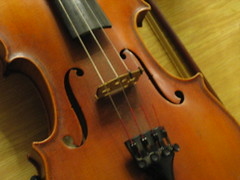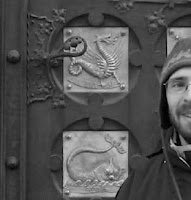If you had asked three weeks ago what I was doing at the weekend, then I would have said: "Going to the 30th anniversary frolic of the Kašava folklore group."
An unsuspecting companion and I set off from Brno on Friday afternoon. The train promised an earlier departure and not terrible connections. In the end, we ended up taking the milk train from Přerov in central Moravia—who knew that the train could stop in so many deserted fields along the way. (We took an
osobní vlak, or "personal train," on this leg of the journey and these trains stop at every village along the way.) Since this was too slow to meet our connection in Otrokovice, we took a trolleybus from the train station into Zlín proper. We met Alex, proceeded to have some pizza, took pictures of the candles lit on Zlín's main square in honor of the 17 November holiday, and then went back to get rested up for the next day’s concert.
The resting did not turn out as restful as might have been hoped (you know how it is when friends get together on a Friday night). But by three the next afternoon, we did drag ourselves, rather slowly, to the dress rehearsal. With only slight help from a map, we found our way from Alex’s apartment to the rehearsal hall, which was where the performance would be later in the evening. The building was mercifully small and we could hear music coming from open windows on the second level. After trying a few locked doors, we finally found one that was open and ultimately into a large rehearsal room filled with performers in various stages of preparation for the concert. Some were wearing t-shirts and jeans, some were in formal clothes, some were partially dressed for the performance, and some were in their complete
kroj (folkloric dress). Most people were playing instruments, dancing, or singing, and there were only a few of us observing from the sidelines.
It was my plan to interview a cimbalom player between the rehearsal and concert. I also wanted to film some footage at the rehearsal for possible usage in a later project. But rather than filming the entire rehearsal, Alex and I ended up looking more at the theater building, a
Baťa-style arts school with a large theater (called
Malá scéna) and studio space in the basement. After the rehearsal, we were a bit worried that there would not be any quiet place to conduct the interview, but fortunately the director of the ensemble found us a relatively quiet room backstage. The building had just been renovated so there was little furniture in the room. There were just enough chairs (and a ladder) for the interview, though. After it was over we were both pretty tired. However, we couldn’t really restrain ourselves (or at least I couldn't) from poking through a rack of costumes in one corner and finding a fruit-adorned hat that was quite amusing. (It wasn’t a Carmen Miranda sort, but rather more Jagermeister with fruit and a ribbon—I know it’s hard to imagine, but it really was like that.)

The finale, of course, was the performance. Kašava was celebrating its 30th anniversary and many alumni and friends were there to participate in the concert. The concert was "moderated" (i.e., hosted) by Jan Rokyta, a well-known cimbalom player and also a producer at Czech Radio Ostrava. The finale was a nice bit of Moravian and Valachian celebration, including "Dyby byla Morava" ("If this was Moravia," which is a sort of classic song that compares Moravia to other places; Moravia, of course, is always preferable in the song). No one was allowed to forget that Kašava is not really a Czech group but a Moravian one, and specifically a Wallachian one (Wallachia, or
Valašsko in Czech, is a region in the Beskydy mountains in north Moravia; the region takes its name from the Wallachia in southeast Romania).
The performance featured appearances by various alumni of the group over its thirty-year history. There was a particularly nice performance of "Na ten fojtův dub" ("To the Mayor's Oak Tree [flew a pigeon]"), a song that was transcribed in 1893 by Leoš Janáček. We were treated not only to a wonderful instrumental performance, but also a beautiful dance performance of an accompanying
starodávna (a couple dance in 3/4 time that is common in northern Moravia).
It seemed that a fun time was had by just about everybody. The filmographers were, however, exhausted and we were quite happy to find our way back to the comfortable couches of Alex’s apartment and finish off our adventures.
 Dyby byla Morava, tajak sú Čechy,Dala bych ti huběnek ze štyry měchy,Ale že je Morava malučká,Ošidila cérečka synečka.
Dyby byla Morava, tajak sú Čechy,Dala bych ti huběnek ze štyry měchy,Ale že je Morava malučká,Ošidila cérečka synečka.If Moravia was like Bohemia,
Then I’d give you a little kiss for four sacks [i.e., of money],
But since Moravia is tiny,
The girl shortchanged the boy.
Thanks,
Joe, for the title.
Tags:
moravia,
music,
folklore,
concert










 A graduate student in music and anthropology writing a dissertation about music in Moravia, the eastern third of the Czech Republic. At some point, the Czech Republic's "second city" (that would be Brno) captured my attention, and I've since been blogging about events, arts, music, and other stuff—basically whatever interests me in and around the cityscape. I'm not living in Brno now, but I keep up with the cultural pulse from afar as best I can.
A graduate student in music and anthropology writing a dissertation about music in Moravia, the eastern third of the Czech Republic. At some point, the Czech Republic's "second city" (that would be Brno) captured my attention, and I've since been blogging about events, arts, music, and other stuff—basically whatever interests me in and around the cityscape. I'm not living in Brno now, but I keep up with the cultural pulse from afar as best I can.

